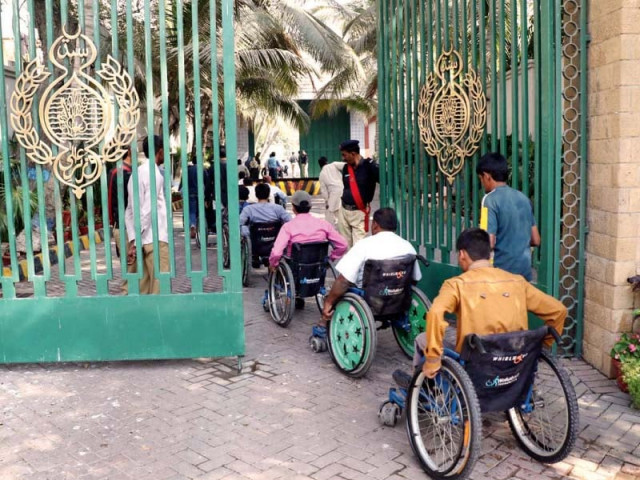Differently-abled patients struggle to access healthcare in Karachi
No helpdesks, counters are designated at public hospitals for low-income patients with special needs

Considering the abysmal state of the country's public healthcare system, every low-income patient entering a government hospital anticipates long hours of waiting in an endless queue before finally getting medical attention however, the trouble of seeking treatment is significantly heightened for people with physical disabilities, who are offered no special arrangements to assist them with their mobility needs.
One such patient was Sadia Shahid, a widowed woman who has been suffering from polio since childhood. "Recently, my right foot developed a wound due to a rash. When I went to the Civil Hospital for an examination, I had to wait for hours before my turn finally came, and I was prescribed an ointment. Now, I am getting treatment from the Sindh Government Liaquatabad Hospital, where I have to wait one to two hours every day. Sadly, there are no facilities available in public hospitals for the treatment of differently-abled persons," said Sadia.
Similarly, Zafar, another differently abled patient who lost both his legs in an accident shared his struggle to receive treatment for his foot pain at the Jinnah Hospital's OPD.
"After a long wait of hours, my turn finally came and I was called for a medical examination. It is a pity that no special desks or counters are designated for the treatment of special persons at government hospitals due to which patients with special mobility needs face many challenges," shared Zafar.
According to Ahmed Raza, a trustee of a welfare organization working for differently-abled people, it is a sad fact that there are no designated facilities for the treatment of people with special needs across all government hospitals and primary health centres in Karachi.
"Whether a person is blind or has mobility issues, they have to line up in the out-patient department (OPD) of government hospitals the same way as a regular patient. No special desks or counters are set up at major hospitals like Jinnah and Civil to cater to the needs of special people," highlighted Raza, who urged the government to announce a policy or strategy in this regard.
"Even though there are 20 large and small government hospitals in Karachi alongside more than 250 primary health centres, none of these facilities have any provisions for the treatment of people with special needs," regretted Dr Farooq Khan, an expert in the field of health management.
On a separate note, a spokesperson for a rescue organization revealed that no special ambulances were operating in the city to cater to the emergency needs of differently-abled people. "If such patients require an ambulance, they are taken to the hospital in a regular one," revealed the official.
"It is the responsibility of the government to provide medical facilities to differently-abled people in government hospitals. The government should construct a special hospital for differently-abled persons in Karachi, where they can access all treatment facilities under one roof," urged Shakeel Dehlvi, a social leader.
As per data obtained from the spokespersons of the Jinnah Hospital, Civil Hospital, and Abbassi Shaheed Hospital, a total of 150 differently-abled persons are reported in the OPDs of the three health centres.
Speaking to The Express Tribune on the matter, officials from the Health Department of Sindh said, "All patients are offered the same medical facilities in all government hospitals of Karachi. The medical policy for special persons will be determined by the provincial government."



















COMMENTS
Comments are moderated and generally will be posted if they are on-topic and not abusive.
For more information, please see our Comments FAQ